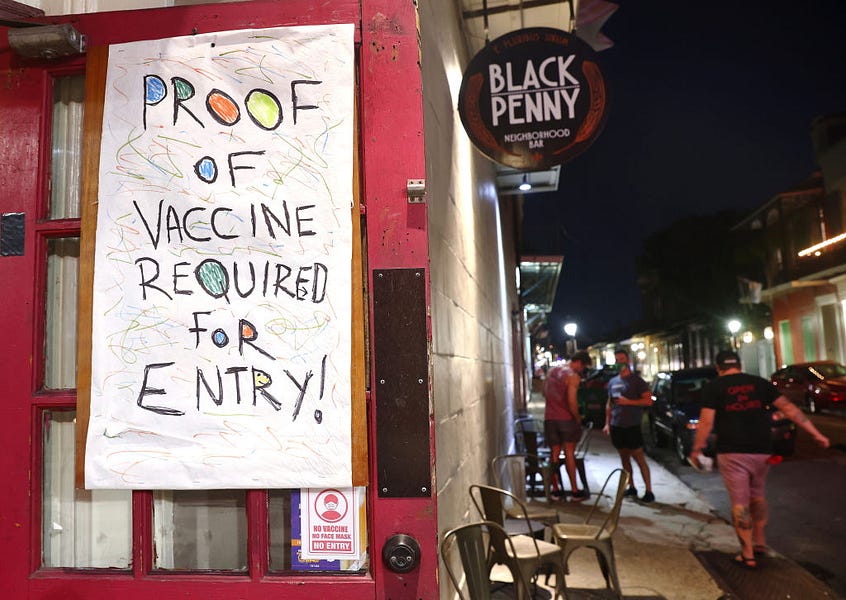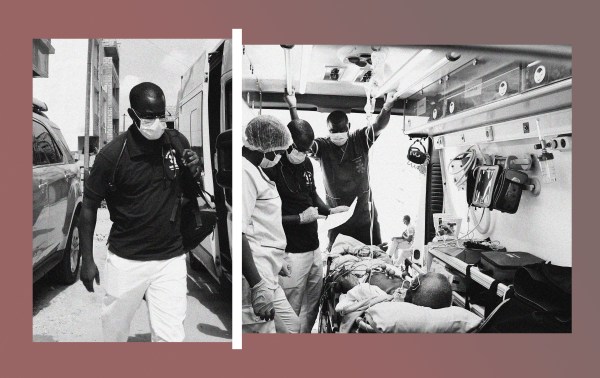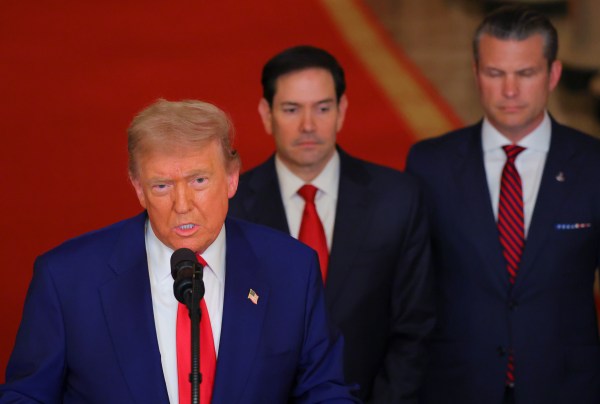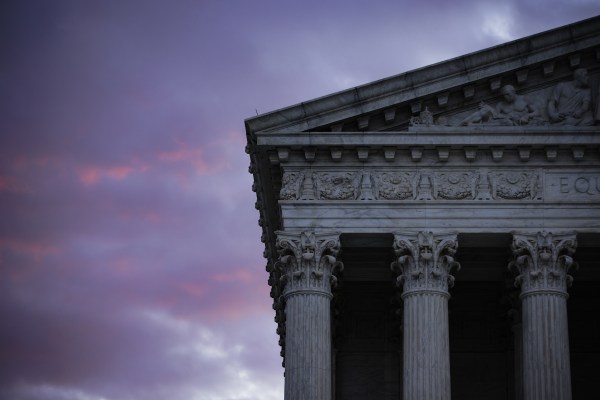When President Joe Biden announced last week that the federal government would soon require millions of workers to get a COVID vaccine or submit to weekly COVID tests, he made the reasoning behind his decision clear: Being unvaccinated is a public health threat, and the federal government has the right to take steps to address that threat in the workplace.
“As your president, I’m announcing tonight a new plan to require more Americans to be vaccinated to combat those blocking public health,” Biden said last week. “The bottom line: We’re going to protect vaccinated workers from unvaccinated coworkers.”
The new requirements have been met with a monsoon of criticism from the right, on the grounds that Biden lacks the constitutional authority to unilaterally require Americans to get their shots. And Biden’s insistence that the vaccinated need to be protected from those around them raises eyebrows, given that the vaccines remain incredibly effective at staving off serious COVID illness and death. But another important question about the forthcoming mandate remains unaddressed too: What about those unvaccinated workers who don’t pose even that miniscule level of threat to their co-workers, because they’ve already acquired immunity by recovering from the coronavirus?
The Occupational Health and Safety Administration (OSHA), which Biden has tasked with creating the rule in question, has yet to release specifics about what its requirements will look like. But there’s little reason to suspect that the previously infected will receive any dispensation from the eventual requirement. The CDC’s recommendations for who should get the vaccine make no distinction between those who have previously had COVID and those who have not. In response to an inquiry from The Dispatch, an administration official said that question would be part of OSHA’s rulemaking process, and deferred questions about who should get the vaccine to the Department of Health and Human Services: “It’s a health question, not [one for the White House].”
The question of who benefits from receiving the COVID vaccine is certainly not a political one. But how that question is translated into public policy necessarily is—especially when the discussion turns from recommendation to coercion.
There’s little question that COVID vaccines are of benefit to practically everyone who is eligible to take them—with the sole apparent exception being some immunocompromised people whose bodies have difficulty mustering up the appropriate antibody response, and for whom booster shots are now being recommended. This is true even for those who already have acquired antibodies from a previous COVID infection, as was shown most recently in a huge (albeit not yet peer-reviewed) observational study in Israel: “Individuals who were both previously infected with SARS-CoV-2 and given a single dose of the vaccine gained additional protection against the Delta variant,” the authors wrote.
But when it comes to the OSHA rule, the question at hand isn’t whether a previously infected person stands to benefit personally from a vaccine. It’s whether he poses a serious comparative danger to his co-workers if he doesn’t get one.
An emergency temporary OSHA standard is no joke: The governing statute requires the agency to demonstrate a “grave danger” exists in the workplace, one that requires an emergency rule to protect workers. And it’s no insult to OSHA’s brain trust to say they’re going to have a bear of a time trying to think up a definition of “grave danger” that gives a green light to those who are vaccinated but not to former COVID patients who are not.
How the immunity earned by surviving a COVID infection stacks up against that bestowed by the vaccine has long been a matter of debate. The most significant recent piece of data on this question, as it happens, is the same Israel study mentioned above—which actually found “natural immunity”—that obtained through infection—confers “longer lasting and stronger protection against infection, symptomatic disease, and hospitalization caused by the Delta variant of SARS-CoV-2, compared to the BNT162b2 two-dose vaccine-induced immunity.”
If that’s true, it’s arguably the whole ball game—if natural immunity is stronger than vaccine-induced immunity, it’s laughable on its face that former COVID patients would be compelled to be vaccinated out of a desire to protect their already vaccinated brethren. Other preprint studies found less striking results, putting the effectiveness of natural immunity roughly at the same level as that of vaccination. But even these underscore the silliness of treating the vaccinated as safe as a matter of policy while shunning the formerly infected unvaccinated as possible workplace Typhoid Marys.
Here it’s important to be very clear about several things. Even if it is true that natural immunity is stronger than post-vaccine immunity, it does not follow that getting to immunity via infection is preferable to getting there via the vaccine. After all, the set of those who have developed natural immunity does not include, by definition, those who did not survive COVID. Comparisons of immunity do not take into account the long-term damage COVID often causes even to its survivors, which many of the naturally infected carry with them right alongside their robust immunity to reinfection. And, as stated previously, there’s plenty of evidence to suggest that even those who do have strong protection against COVID thanks to former infection still stand to benefit from even stronger protection should they choose to get the vaccine.
“There was a Kentucky study that shows that if you’re naturally infected and then immunized, as opposed to naturally infected but not immunized, the person who was immunized has a 2.5-fold lesser risk of being infected,” Dr. Paul Offit, a pediatrician and virologist at the Children’s Hospital of Philadelphia, told The Dispatch. “So there’s an advantage to vaccination.”
But it’s one thing to say that a given person is not as protected from COVID infection as possible, and another thing entirely to insist that person presents a “grave danger” to the people around him, significant enough for the federal government to mandate he make changes to his behavior.
“If we’re going to OSHA mandates,” Offit said, “it’s not an unreasonable thing for someone to say, ‘I have been naturally infected, I think I’m likely to be protected against severe disease, and I would prefer not to get a vaccine.’ I think that’s something someone could reasonably say. It just means you have to prove it, you know, with an antibody test, which is expensive and time-consuming.”
The possibility of allowing previously infected people to opt out of mandates would doubtless create additional bureaucratic complexity—which is part of the reason some public health experts want to see OSHA forgo them altogether.
“When we go into the military, we don’t sort people out—tall, short, fat, skinny,” Dr. William Schaffner, a professor of preventive medicine and infectious diseases at Vanderbilt, told The Dispatch. “Line up! You’re all getting the vaccine! Thank you, next! Next! And that’s the trick: Stop being so prissy. When we move into public policy, the operative rule is KISS: Keep it simple, stupid.”
“It has everything to do with implementation,” Schaffner continued. “We can’t say—‘Well, I think I had it back in January.’ ‘Well, do you have a doctor’s statement? Do you have a positive test?’ ‘No, but I felt like it, and my Aunt Suzie had it, and I was exposed to her—’ Sorry. Roll up your sleeve, bang.”
But needless overcomplication may be less of an issue in a workplace vaccine verification system, where employers aren’t administering vaccines—just documenting them. It isn’t clear why it’d be more complicated, for instance, for a workplace to accept documentation of a recent positive COVID antibody test in place of vaccine documentation, if OSHA were to permit them to do so.
In such a case, the biggest barrier to demonstrating prior COVID infection would likely be the antibody test itself. A serology test is blood work—requiring a sample of your blood to be sent to a lab and analyzed, which, as Offit noted, is more labor-intensive, expensive, and time-consuming than simply receiving a vaccine. Still, for people dead-set on not receiving a vaccine, such an option may present a viable alternative.
That is, of course, if the White House lets them. In announcing the new mandate, Biden insisted the decision had nothing to do with punishing those who have declined so far to go along with public health advice and get vaccinated—rather, it was a simple matter of protecting public health. Whether his Department of Labor ends up insisting people with natural immunity represent a “grave danger” to all around them will be an interesting test of that proposition.






Please note that we at The Dispatch hold ourselves, our work, and our commenters to a higher standard than other places on the internet. We welcome comments that foster genuine debate or discussion—including comments critical of us or our work—but responses that include ad hominem attacks on fellow Dispatch members or are intended to stoke fear and anger may be moderated.
With your membership, you only have the ability to comment on The Morning Dispatch articles. Consider upgrading to join the conversation everywhere.